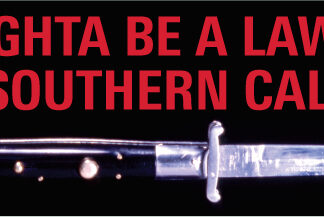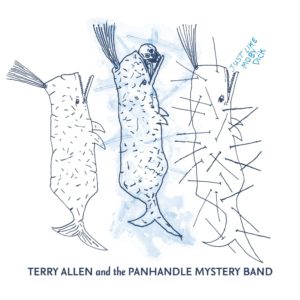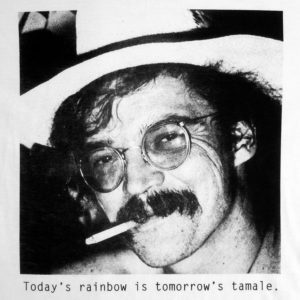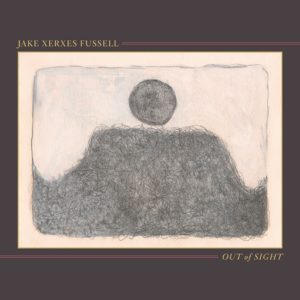Album Narrative
I think there are three great American inventions: one is duct tape, one is hot glue, and the other one is putting radios in cars.– Terry Allen, “A Self-Interview,” 1994
The five works on Terry Allen’s Pedal Steal + Four Corners were all created during a period of intense, condensed creativity spanning eight years, are all closely related to his interdisciplinary bodies of visual art and performance, and are all set in the American Southwest and West. Like Allen’s songwriting, which only nominally fits within the realm of country music (“Which country?” Terry quips), his work for radio, and his long-form narrative audio recordings more broadly, appropriate the general form and format of the genre, or medium, of popular radio dramas—monologue, dialogue, songs, interstitial instrumentals, and diegetic sound cues within a roughly thirty minute running time—but transform it into something much denser with meaning within a postmodern art context. They prefigure similar podcast experiments by decades.
-

-
Performance still from Pedal Steal dance performance at BAM.
-

-

-

-

Pedal Steal (1985), originally composed as the Bessie Award-winning soundtrack to a dance performance by Margaret Jenkins Dance Co.—and the only one of these works that has been previously released—actually premiered not on air, but rather onstage at the Brooklyn Academy of Music. However, its Four Corners companion pieces would not have been possible without the earlier and more structurally complex, blueprint of Pedal Steal, the first long-form narrative recording Allen undertook with the support of the Panhandle Mystery Band, actor and writer (and Terry’s wife) Jo Harvey Allen, and other collaborators including fellow Lubbockites Butch Hancock and Rolling Stones saxophonist Bobby Keys. The story elides the New Mexican pedal steel guitarist Wayne Gailey and legendary outlaw Billy the Kid into a spectral composite character called Billy the Boy, resurrected by a postmortem chorus in English, Spanish, and Navajo.
Torso Hell (1986), Bleeder (1990), Reunion (a return to Juarez) (1992), and Dugout (1993) together comprise the Four Corners suite, a reference both to a song from Allen’s first album Juarez (1975), and to the site where the state lines of Colorado, New Mexico, Arizona, and Utah crash in a cartographic crucifix. Allen designed these radio plays specifically for listening in a car, always a favorite space to audition his audio work. All Four Corners works were broadcast on NPR affiliates nationwide. The latter three were commissioned by New American Radio, an organization which, from 1987 to 1998, commissioned more than 300 experimental works for radio by artists such as Pura Fé, Pauline Oliveros, and Christian Marclay.
Even moreso than Pedal Steal, with which it shares a creative genealogy, Torso Hell is a direct and visceral articulation of Allen’s YOUTH IN ASIA body of work (1982–92) and its examinations of the psychological residues and betrayals of the Vietnam War. This “radio movie” about a quadriplegic Vietnam veteran’s torments and revenge shares the extreme violence and sexuality of its pulp inspirations, but presses into the realm of absurdity and metafiction, serving simultaneously as a parody of trashy B horror flicks and ponderous Hollywood Vietnam movies and as a vicious commentary on war and its endless rhetorical wake, the ways we abuse, exploit, and ignore our veterans while spouting inane pieties about honor, service, and patriotism.
Allen’s Anterabbit/Bleeder (a biography) cycle (1982–90) deploys fact and fiction, drawn partly from the life a hemophiliac childhood friend, to explore the very nature of biography and history, the ways our language and memories fail and fool us with their feeble reenactments and fractured transmissions of the past filtered through our myopic present. Memories are hemorrhages, Bleeder suggests, that stain our speech, our stories, and our mark-making with Rorschach bruises of untruths, exaggerations, and fantasies.
Ostensibly the “simple story” of the fateful but arbitrary murder, in a “small, rundown mountain trailer” in Cortez, Colorado, of Navy boy Sailor and his new bride, the Tijuana prostitute Spanish Alice at the hands of Juarez-born pachuco Jabo and his LA girlfriend, the “rock writer” and bruja Chic Blundie, the narrative of Allen’s iterative JUAREZ cycle (1968–present) spirals outward, and inward, recursively through a palimpsest of possibilities, a constellation of connections. Reunion (a return to Juarez) offers a retelling of the tale, deployed both as a radio play and as the soundtrack for the sculptural installation a simple story (Juarez) (1992), exhibited at the Wexner Center but originally conceived as stage set studies for a Juarez musical, co-written with David Byrne but never produced.
His most personal and autobiographical work, DUGOUT is based loosely on the lives on Allen’s father, a retired professional baseball player turned promoter of concerts and wrestling, and his mother, a barrelhouse-style piano player and “the first woman ever to be thrown out of SMU [Southern Methodist University], for playing jazz with black musicians in Deep Ellum in Dallas.” Allen himself describes the DUGOUT cycle, which includes Dugout the radio play, as “a love story, an investigation into how memory is invented, a kind of supernatural-jazz-sport-history-ghost-blood-fiction that rolls across the late nineteenth century into the mid-twentieth century.”
Pedal Steal + Four Corners serves as a ligament between Terry’s music, writing, visual art, and theatrical work, and as a bridge to Jo Harvey’s writing, theatrical work, film work, and acting. And yet they function as standalone documents, stripped of the accretion of visual cues, the shell of objecthood, while retaining the density and transport of dreaming. In the absence of the visual, what is left resembles spells, rituals, enactments of story and spirits, air and angels—in other words, memories.
Acknowledgments
A masterpiece cast on the biggest, blankest drive-in screen you ever didn’t see. As they used to say, the pictures are better on radio, and Allen is the biggest thing there’s ever been in radio pictures. Think Hunter S. Thompson rather than Garrison Keillor. Think Robert Ashley rather than Carla Bley and Paul Haines. If you wanted some kind of working/able comparison, it would have to be Bob Dylan’s Renaldo and Clara. Allen’s aural brilliance is to make narrative resemble music, and to let the music tell the story.
– The Wire
Navajo chants blend into fuzzed-up steel guitar; dirty-realist narratives succumb to skeletal ballads; B-movie dialogue blossoms over a plaintive violin. Pedal Steal represents roots rock’s rarely encountered experimental fringe.
– The Times
Terry Allen conjures bodies of work in which the borders between medium and material are blurred and bloodied, stained with memories and stoked by the throttling of life through time. His practice encompasses music, sculpture, video, painting, and theater, resulting in hybrid works that escape familiar categorization. It is the radio, however, that provides the soundtrack to Allen’s mythic Southwest, a wide open imaginary landscape haunted by denizens he describes as “climates” rather than characters.
– Aquarium Drunkard
It literally jumped to being my favorite record. It’s so far-out, but so fine-tuned at the same time.
– Kurt Vile, Rolling Stone
There are before-and-after moments in life; discovering Terry Allen was one of those for me. In the five or so years since my introduction, I’ve learned that you don’t just listen to or look at Allen’s art, you experience it. One of Allen’s most enduring and enigmatic lines, ‘Today’s rainbow is tomorrow’s tamale,’ sounds like something Beckett might’ve written if he’d hung out with goat ropers and dipped snuff. Pedal Steal + Four Corners should be consumed whole and with attention, best served with a stretch of dark highway in a vaguely foreboding place.
– Texas Monthly
Complete and vibrant, all of these stories draw the listener in so deep they have to fight the urge to duck from a stray bullet or take a shower after a dirty motel room romp.
– Houston Press
Includes numerous moments of that surreal poetic western beauty that epitomises Allen’s finest work, an acid western musical companion to Cormac McCarthy or Jim Jarmusch.
– Uncut
The combined effect here is that of constant movement through lives led in the hinterlands.
– MOJO
A+. Pedal Steal +Four Corners takes the idea of abbreviating his body of work to one or a few examples and blows it completely to smithereens. Whether listening at home or perhaps exploring the artist’s belief that the best way to soak all this stuff up is to hear it while out navigating a stretch of the open road, it becomes obvious that as he transcends easy classification, there is no other artist like Terry Allen. Suffice it to say, he’s a long way from outlaw country.
– The Vinyl District
Think Sam Shepard with steel guitar, and you’ll get the idea.
– The Independent
Singer-songwriter is only a small piece of the 75-year-old’s portfolio. The husband of artist and fellow Lubbock native Jo Harvey, Allen is better known to the art world as a blithely boundary-ignoring sculptor and painter, playwright, and video producer, often incorporating a wide variety of work into major conceptual art installations. And he’s not afraid to get weird.
– Texas Highways Magazine
The idiosyncratic Texas songwriter and visual artist’s music pairs with Sam Shepard plays like lime goes with tequila; but the noir-ish radio plays comprising his Four Corners suite are Allen’s own. They’re animated by Allen’s mordant wit, dusty twang, scenic songs, kleptomaniac cattle queens, suicidal musicians, migrants, conmen, pill poppers, prostitutes, wayward sailors, and players including Butch Hancock, Rolling Stones saxophonist Bobby Keys, and inestimable narrator (and 1960s-era KPCC host) Jo Harvey Allen. Poetic aphorisms abound (“All good luck has death in it”) in this two-and-a-half hour package, and it’s all pungently, beautifully weird.
– Pasadena Weekly
Conceptual pieces that defy logic, space and time. Tape recordings, spoken-word, distorted guitars, thunderous drum fills and haunting stories await you. These Sam Shepard-like narratives are literally stuff that dreams are made of.
– Hub City Spokes
Allen takes no prisoners, pulls no punches.
– Rolling Stone
Allen’s songs extract strangeness from the known world and use it as a means of acquiring greater knowledge.
– The New Yorker
He’s pretty close to a master lyricist.
– The NY Times
Riveting.
– NPR
Stunning poetry. The lines themselves quiver with a raw vision rarely heard.
– Pitchfork
I love Terry. He’s a funny son of a bitch.
– Guy Clark
People tell me it’s country music, and I ask, “Which country?”
– Terry Allen

















































































